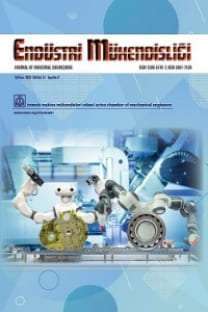Plastik parçalar üreten bir fabrikanın montaj hatlarının çizelgelenmesi
Bu çalışmada, plastik parça üreten bir fabrikanın montaj hatlarının çizelgelenmesi problemi ele alınmıştır. İşletmedevar olan montaj hatlarının bazılarında sadece belli parçalar üretilebilmektedir. Bazı hatlar ise paralel çalışabilmektedir.Montaj hatlarında kısa ve standart işlemler yapıldığından üretim tek kademeli olarak varsayılmıştır. Böylece, özel ürünleriüretebilen montaj hatlarının çizelgelenmesi problemi, tek makine çizelgeleme problemi, alternatif hatları çizelgelemeproblemi ise özdeş paralel makine çizelgeleme problemi olarak ele alınmıştır. İşlerin hazır olma zamanları ve paralel montajhatlarında her vardiyada farklı sayıda hattın çalışabilmesi gibi sürece özel kısıtlar mevcuttur. Söz konusu kısıtları dikkatealacak şekilde iki matematiksel model geliştirilmiştir. Oluşturulan modeller GAMS yazılımı kullanılarak çözülmüş ve eldeedilen sonuçlar mevcut çizelgeler ile karşılaştırılmıştır.
Scheduling the assembly lines of a plastic products manufacturer
In this study, assembly lines scheduling problem of a plastic product manufacturer has been considered. In someassembly lines of the factory, only some special products can be produced. The other assembly lines are parallel. Weassumed that the production has one stage because the lines have standard processes with short processing time. Forthat reason, the assembly line scheduling problem for the lines which can produce only special products is consideredas a single machine scheduling problem and also parallel assembly line scheduling problem is considered as an identicalparallel machine scheduling problem. There are some process oriented constraints like release dates and shift availabilitiesof lines. Two mathematical models with process oriented constraints are developed. Proposed models have solved by thesolver of GAMS optimization software and obtained schedules have compared with the schedules used by the factory.
___
- 1. Allahverdi, A., Ng, C.T., Cheng, T.C.E., Kovalyov, M.Y., 2008. “A Survey of Scheduling Problems With Setup Times Or Costs,” European Journal of Operational Research, 187, 985–1032.
- 2. Chang, P.C., Chen, S.H., Lin, K.L. 2005. "Two-phase Sub population Genetic Algorithm for Paralel Machine Scheduling Problem” Expert syst Appl 29, 705-712.
- 3. Chen, W.J. 2007. “An Efficent Algorithm for Scheduling Jobs on a Machine With Periodic Maintaenance,” Int 7 Adv Manuf Technol 34, 1173-1182.
- 4. Demirel, T., Özkır, V., Demirel, N. Ç., Taşdelen, B., 2011. Proceedings of the World Congress on Engineering Vol II, July 6-8 2011 London U.K.
- 5. Eren, T. 2008. “A bi-criteria Parallel Mmachine With a Learning Effect of Set Up and Removal Times. Appl Math Model (in press)
- 6. Eren, T., Güner E. 2006. “A Bi-criteria Scheduling With Sequence-dependent Set up Times,” Appl Math Comput 179, 378-385.
- 7. French, S., 1982. Sequencing and Scheduling: An Introduction to the Mathematics of the Job Shop, John Wiley & Sons, New York.
- 8. Haral, U., Chen, W.R., Ferrell, W.F.J., Kurz M.B., 2007. “Multiobjective Single Machine Scheduling With Non- traditional Requirements,” Int J Prod Econ 106, 574-484.
- 9. Kaplan, S., Rabadi, G., 2012. “Exact and Heuristic Algorithms for the Aerial Refueling Parallel Machine Scheduling Problem With Due Date-to-deadline Window and Ready Times,” Computers & Industrial Engineering, Vol:62, February 2012, 276–285.
- 10. Molaee, E., Moslehi, G., Reisi, M., 2010. “Minimizing Maximum Earliness and Number of Tardy Jobs in the Single Machine Scheduling Problem,” Computers & Mathematics with Applications, Vol:60, December 2010, 2909-2919.
- 11. Pinedo, M., 2002. Scheduling Theory, Algorithms, and Systems, Prentice Hall, New Jersey, U.S.A.
- 12. Ranjbar, M., Davari, M., Leus, R., 2012. “Two Branch-and- bound Algorithms for the Robust Parallel Machine Scheduling Problem,” Computers & Operations Research Vol: 39 July 2012, 1652-1660.
- 13. Siouda, A., Gravela, M., Gagne, C., 2012. “A hybrid Genetic Algorithm for the Single Machine Scheduling Problem With Sequence-dependent Setup Times,” Computers & Operations Research, Vol 39, October 2012, 2415-2424.
- ISSN: 1300-3410
- Yayın Aralığı: Yılda 3 Sayı
- Başlangıç: 1989
- Yayıncı: TMMOB MAKİNA MÜHENDİSLERİ ODASI
